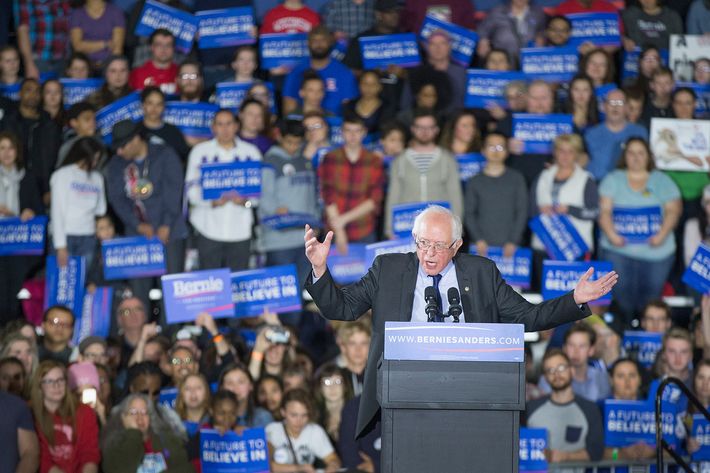
Bernie Sanders collected three commanding victories on Saturday, winning the Democratic caucuses in Washington, Alaska, and Hawaii by considerable margins over front-runner Hillary Clinton. Sanders won Washington by roughly 73 percent to Clinton’s 27 percent, Alaska 81 percent to 18 percent, and Hawaii 70 percent to 30 percent. In all, Sanders banked 55 new delegates from Saturday’s contests, while Clinton gained 20:
It’s also worth noting that when Washington allocates 67 more delegates awarded by congressional district, Sanders will likely add another 40 or so net delegates, reducing Clinton’s lead in pledged delegates to the neighborhood of 230.
Next up on the calendar for Democratic voters: Bernie could score an upset win in Wisconsin’s open primary on April 5. Then there’s a caucus in Wyoming on April 9, followed by the very big deal that is New York’s closed primary on April 19, when 247 delegates will be up for grabs.
Why did Sanders clean up on Saturday? On one hand, that’s because Sanders typically performs well in caucuses, while Hillary Clinton, dating back to 2008, doesn’t. So far this cycle, Clinton is losing to Sanders in caucuses by 26 percent, while in 2008 she lost caucuses to Obama by 34 percent. On the other hand, as the Washington Post’s Phillip Bump details, Washington and Alaska’s electorates were also predominantly non-black, continuing what has become a decisive trend:
When the composition of the black Democratic electorate has been below seven percent for states where Democratic primary exit polling in 2008 or 2016 was available, Clinton has lost by an average of 30 points this year. Over that percentage? She’s won by 26.
(Hawaii, interestingly, didn’t fit that mold, as it still overwhelmingly caucused for Sanders despite the state’s Democratic electorate being 13 percent black.)
In a separate post, Bump has some more bad news for Sanders supporters feeling bullish after Saturday:
There’s an argument that Sanders’s big victories on Saturday will help swing the upcoming states — the momentum idea and all that. Sure! Possible! When Sanders won New Hampshire by a mile, though, it was followed by Clinton crushing him in South Carolina. When he won Michigan against all odds … he then lost Illinois and North Carolina and Ohio in a five-state Clinton sweep. He lost Florida — where Clinton netted about 70 delegates alone. Demographics that have proven to be the more reliable predictors of victory than momentum.

And only three caucuses remain moving forward, none of which will yield many delegates, so Sanders’s big advantage in that area is finished, and few states with predominantly white Democratic electorates remain either. The crucial stocks of remaining delegates will thus be awarded via diverse, big-state primaries, and Clinton has been beating Sanders in those contest by over 23 percent so far this year. Regardless, Sanders’s wins on Saturday re-justify his continued presence in the race and will likely help him raise more money to keep going, which will in turn help fund advertising pushes in the next two big states, New York and Pennsylvania. Plus, fundraising is already one area where Sanders has been defeating Clinton handily, and mostly via small donors. Meanwhile, Clinton’s attempts to woo Sanders supporters have mostly fallen flat, as the Atlantic’s Yoni Appelbaum summarizes:
Clinton has, in recent months, embraced many elements of Sanders’s platform. She’s adopted the language of intersectional politics. She’s echoed his skepticism of trade deals. She’s insisted she’ll be tougher on Wall Street than he’d be. But so far, at least, she’s had little success in winning over his supporters, and she’s struggled to inspire a similar degree of enthusiasm among her own backers.
Sanders’s voters seem undeterred by Clinton’s advantages. “I feel like probably for the first time since I’ve been voting I connect with somebody I really believe in and that I trust,” one supporter told the Seattle Times. Saturday’s vote suggests she’s not alone. Party officials in Washington said that at least 225,000 voters showed up, rivaling the record turnout of 2008; the 10,600 who voted in Alaska exceeded that state’s 2008 tally; and the 33,716 in Hawaii, while below the 2008 level, included 7,000 new Democrats registered since late last year.
Nonetheless, as most political analysts continue to point out, Sanders will still need to broaden his supporter base in order to overcome both Clinton’s primary-voter advantage, as well as her pledged-superdelegate total, though those party insiders can, as many did in 2008, change their pledges before the convention — which is exactly what Sanders suggested they would do on Sunday morning. Time’s Sam Frizell outlines Sanders’s not-so-clear path to the nomination, noting that Sanders will need to win at least 57 percent of the remaining pledged delegates to take the majority, plus convince superdelegates to switch sides. Frizell also points out that Team Sanders seems to be working on a back-up plan to make sure his campaign has a lasting impact, no matter what:
His advisors have begun discussing demands they may make at the Philadelphia convention if their candidate is not the nominee, including pushing the Democratic Party to adopt new resolutions against using super PAC money in primary races.
Sanders himself has envisioned realigning the Democratic Party and overhauling many of the values and tenets ushered in by President Bill Clinton in 1992. The former president’s wing of centrist Democrats advocated for welfare reform and ultimately, free trade deals that Sanders despises.
“If I can’t make it, we want to completely revitalize the Democratic Party and make it a party of the people rather than one of large campaign contributors,” Sanders said in an interview last week.
This post was updated to include information about the additional delegates that will eventually be allocated from Washington.






























